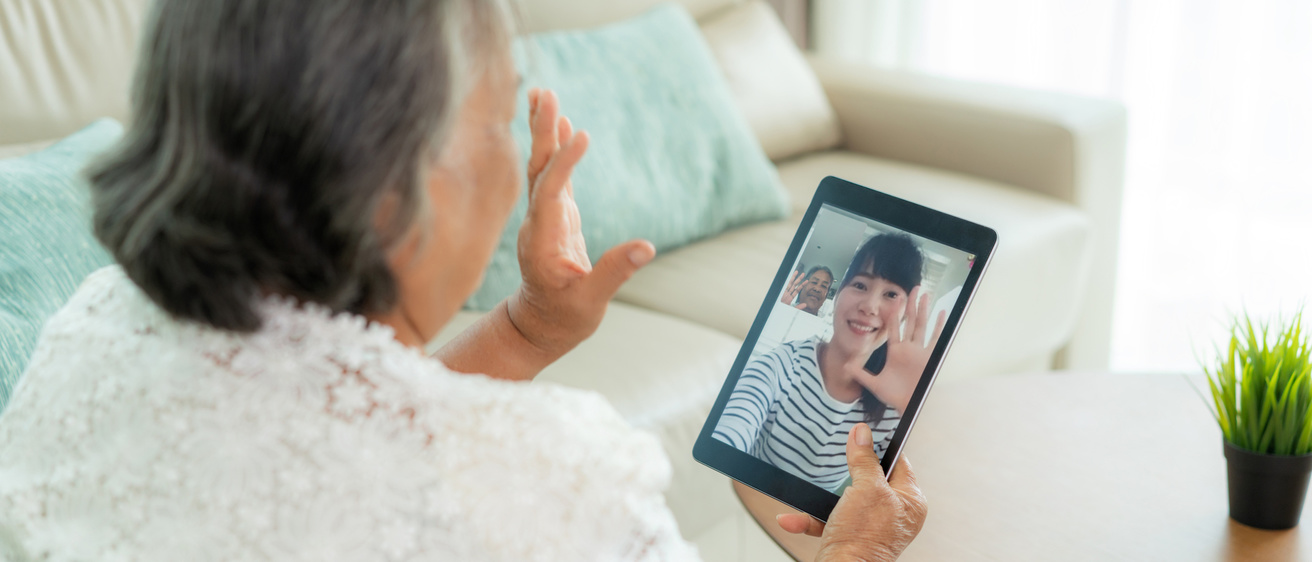Remote caregiving includes managing and providing care for older ones from afar. Many have already been doing remote caregiving long before this concept was labeled during the pandemic.
Caregiving at any distance can cause anxiety, especially if you do not get to see your loved one as often as you like. The best way to set your mind at ease is to make sure that your loved one is provided with all of the care and help that they need when you or your family cannot physically be there for them.
Communication is one of the most important needs of remote caregiving. If you and your family are spread out physically, making sure everyone understands the plan and is prepared will help prevent disaster.
Keep communication clear and direct with a detailed list of everyone involved in care and their assigned duties. Family dynamics are always different, so determining who may contribute to caregiving is not always as simple as turning to a person’s relatives. Here are some examples of people to communicate with if you are acting as a remote caregiver:
- Family members: siblings, aunts, uncles, etc.
- Neighbors or friends of your elderly loved ones who check up on them
- Professional care services (home care service, assisted/independent living communities)
- Physicians or other health care professionals
In case of emergencies, you will want to be able to call the right people who may live closer to your family member such as neighbors, friends, or caretakers who see them on a regular basis.
Delegating Responsibilities
If you are coordinating caregiving with a group of family members, simplify the process by delegating responsibilities. It is best practice to identify one person to act as the primary facilitator of remote care.
The family member who lives the closest helps with daily tasks such as cooking and cleaning, serves as their emergency contact, and has the duty of keeping everybody else in the loop of communication.
However, the primary facilitator does not have to do it alone. Requesting assistance from family members is essential. A family member who lives farther away could take your loved one to a doctor’s visits or outings that require less frequent attention but still contribute to the caregiving duties. Other family members can offer financial support or coordinate and plan with professional care services.
Even with proper organization, planning, communication, and delegation, remote caregiving can feel overwhelming at times. Regular family meetings will reduce miscommunications and keep everyone up to date. These meetings are important to reevaluate the care plan, make appropriate changes, and give everyone a chance to voice any concerns or emotional difficulties they are experiencing.
Assembling in person for a family meeting may not be a viable option right now, but programs like Zoom, Skype or FaceTime are great options for video calls. Group chats or email threads create more regular and fast communication.
Consider a Professional Care Coordinator
If your elderly loved one requires more hands-on care, consulting a professional Senior Resource Specialist or a Care Coordinator may be a good idea, especially if you and the rest of your family live farther away. A professional care coordinator may be a nurse or social worker who will evaluate the needs of your elderly loved one and help connect them to the services they need. They can help find the best options for hands-on care that are affordable and accessible, and they can help keep track of what your elderly loved one needs.
Check In With Your Loved One
Check in with the person you care for directly to see what you can do to ensure their comfort and health. This will give you awareness of how they are doing and strengthen your relationship with them. Stay in contact with daily caregivers, especially if your loved one has trouble with cognition or rational reasoning. Those around them can let you know how they are doing if you feel you cannot trust your loved one’s own evaluation of their needs.
Utilize Technology
Various forms of technology available to help families with caregiving needs. For example, medication management technology sends your loved one alerts with reminders to take important medications on time. These medication dispensers also will alert you that the medication was taken on time or alert you if it was missed.
Ask for Support
As a remote caregiver, it is especially important to reach out for help when you need it. Evaluate why you have taken this role, and ensure others involved in remote care are doing the same. Make sure the level of care for each of you is balanced. No matter how dedicated you are to supporting your loved one, you may need assistance in the process.
CONTACT US AT:
www.livwellseniors.com
info@livwellseniors.com
319-250-1577
LivWell Senior’s referral and placement services are always free. At LivWell Seniors, we understand that making the right senior living decisions can be complicated. Our compassionate, knowledgeable and local Senior Resource Specialists (SRS) will support you and your family through this journey.
LivWell Seniors is more than a referral organization—it is an organization that helps seniors thrive. Our seniors have worked hard to help build our communities and now, it is our turn to make sure they are cared for in the best ways possible. We at LivWell Seniors call it the Freedom to Live Well!
This article originally appeared in the liveWELL 2021 Winter Employee Well-Being Newsletter.
